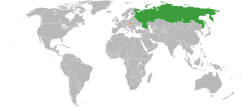Russia–Slovakia relations
 | |
Russia |
Slovakia |
|---|---|
Russia–Slovakia relations (Russian: Российско-словацкие отношения, Slovak: Rusko-slovenské vzťahy) date back to when diplomatic relations were established upon Slovakia gaining its independence on January 1, 1993. Russia opened its embassy in Bratislava in 1993. Slovakia also has an embassy in Moscow. Unlike Slovakia's neighbour and close ally Czech Republic, which has a negative view of Russia due to past events, Slovakia tends to have better relations with Russia.[1][2][3][4]
2022 Invasion of Ukraine[edit]
After the 2022 Russian invasion of Ukraine started, Slovakia, as one of the EU countries, imposed sanctions on Russia, and Russia added all EU countries to the list of "unfriendly nations".[5]
Slovakia joined other countries in spring 2022 in declaring a number of Russian diplomats persona non grata.
On 16 February 2023, Slovakia's parliament defined the Putin regime as "terrorist" and formally designated Russia as a state sponsor of terrorism.[6]
On 2 October 2023, Slovakia recognized reapprochement with Russia. On 25 October 2023, Robert Fico became the Prime Minister of Slovakia
On 20 January 2024, Slovakia's Culture Ministry said that Slovakia would resume cultural exchange with Russia and Belarus.
Trade[edit]
In 2021 Russia exported $6.05 billion of goods to Slovakia with natural gas being the main product. Slovakia exports were $1.98 billion with cars being the main product. Between 1995 and 2021 Russian exports have risen by an average of 8.14% p.a. whereas Slovakian exports rose by 7.19% p.a. on average.[7]
Slovakia is making plans on disconnecting from Russia's energy exports in accordance with EU decisions and sanctions following the 2022 Russian invasion of Ukraine.[8] In April 2023 Minister of Energy Peter Gerhardt dismissed Russian attempts to blackmail his country over energy supplies, although Russian crude, gas and nuclear fuel dominate the market in Slovakia. Gerhardt refused to cower over his country's support for Ukraine. 60 percent of its natural gas, 95 percent of its oil and all of its nuclear fuel are obtained by Slovakia from Russia. Slovakia’s main petroleum refinery was built to process Urals grade crude and thus “big investments” will be needed by it to accept other types of crude.[8]
In August 2023 the result of an international tender for the supply of nuclear fuel was won by Westinghouse. Rosatom was excluded from bidding.[9]
It was reported in May 2024 that Economy Minister Denisa Sakova said Rosatom would not be allowed to participate in a possible tender to build the next nuclear power plant in Slovakia, which generates over 50% of its electricity at its existing nuclear plants.[10]
See also[edit]
References[edit]
- ^ Kalan, Dariusz; Vass, Ágnes (27 April 2015), Big Gestures, Small Actions: Paradoxes of Slovakia's Policy towards Russia (PDF), The Polish Institute of International Affairs, retrieved 11 March 2021
- ^ Machajdík, Matúš (25 December 2017), What's the future of Russian-Slovak relations? (webpage), Duel Amical, retrieved 11 March 2021
- ^ Kalan, Dariusz (26 June 2018), Why Is Slovakia, a Proud EU and NATO Member, Drifting Toward Russia? (webpage), World Politics Review, retrieved 11 March 2021
- ^ Mesežnikov, Grigorij (31 March 2020), A Friend Lost? (webpage), Visegrad Insight, retrieved 11 March 2021
- ^ Lee, Michael (8 March 2020). "Here are the nations on Russia's 'unfriendly countries' list". CTV News.
- ^ RFE/RL. "Slovak Parliament Designates Russia A State Sponsor Of Terrorism". RadioFreeEurope/RadioLiberty. Retrieved 2023-02-16.
- ^ "Russia/Slovakia". January 2022.
- ^ a b "You don't scare us: Slovakia shrugs off Kremlin energy retaliation for arming Ukraine". 3 April 2023.
- ^ "Slovakia dumps Russian nuclear fuel". 16 October 2023.
- ^ "Slovakia plans to build a new nuclear reactor".
External links[edit]

